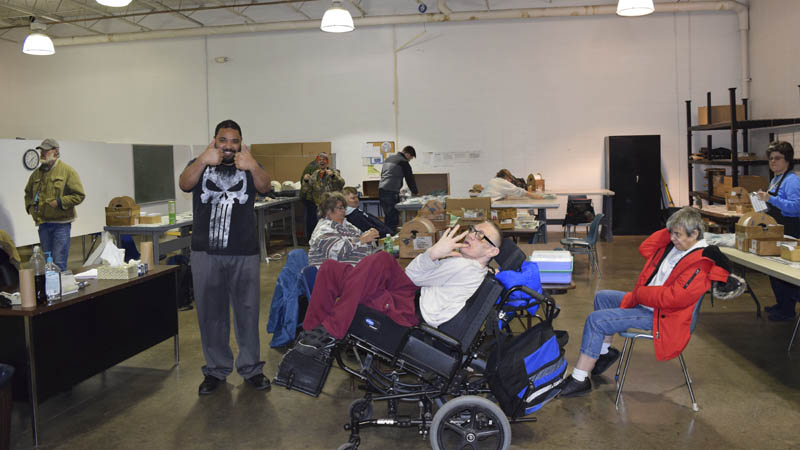Preparing for life
Published 10:37 am Friday, January 6, 2017

- Clients in the PCS workshop work on projects for a number of clients, from Rustoleum to Cintas to Ford.
Person Centered Services picks up where Tri-State Industries left off
COAL GROVE — Starting Jan. 2, a quiet transition took place at Lawrence County’s Board of Developmental Disability’s work shop. The old board ran Tri-State Industries ceased management of the workshop, and Person Centered Services (PCS) took over.
For the most part, things are the same for the folks who work there. They are doing the same jobs for the same companies, explained the facility director Sheena Wiseman. This includes work labeling buckets for Rustoleum, oiling and packaging O-rings that will be sent to Ford for Alavard, and refurbishing hangers for Cintas, she explained. Where the changes have taken place have been on the administrative backend, and in the additional opportunities that they plan to provide to the folks who work there.
“We had about a month, month and a half to turn it around,” said PCS regional director Jaime Thornton. “I think it’s been very good. Very smooth. A few little bumps and hiccups every now and then, but that’s to be expected.”
These issues, like dead truck batteries and transportation scheduling issues, were all worked out quickly however.
Now the new management can focus on continuing the kind of quality based changes they’ve already started. While stability and continuity are important to the transition, they both explained, they do want to begin extending new opportunities to their clients.
“The workshop area is going to stay exactly the same as (how) it was,” Thornton said. The individuals are going to keep the same jobs they were doing. We’re going to build on that. For PCS, we like to do volunteer opportunities in the community. We’re going to reach out to many community businesses, like the Humane Society… to see if we can help them out in any way. We see that as job skill building for them, so they’re not always working within these four walls. The goal, obviously, is to get them out in the community working community jobs.”
If they do get jobs in the community, PCS would then help them with the transition, including providing transportation if necessary.
This is different than the focus was under Tri-State, according to Wiseman, who also worked under the old system.
Especially the community outreach plan.
“Tri-State was strictly a workshop,” Wiseman said, “and we offered community service employment services also.
(But) with PCS, we’re planning more outings.”
This, she felt, could be more beneficial for both the community and their clients.
“We love being involved in the community,” Thornton added. “Letting the community know our individuals and the individual used to being in the community and used to (typical) living situations.”
Thornton said that it was “very important” to give them the opportunity to begin working and building relationships with the community.
“It may not be realistic for some of them,” she conceded, but for as many as possible, it’s “very important” to get them into a typical work setting.
“We’d love that, (if) all of our individuals could go and get community jobs,” Thorton said. “It may not be realistic for some of them, (and) we love to have them here. But it’s even better when they actually leave and go and get a new job, because it’s normal life. They don’t have to worry about living here in this building every single day. They get to go out and see all kinds of different people, and different situations. More work. Better benefits. Those kinds of things.”
While some of the plans for community outreach are still down the road a little ways, immediate changes in the facility are already having a positive impact on the workers there. Crystal Music, who oils and boxes O-rings and enjoys helping her co-workers with tasks like counting their pieces, said she is already excited about some of the life skills classes being offered, like the cooking class, and has found the new relaxation rooms to be helpful in defusing stressful situations.
“They have an exercise classroom,” she explained, listing the changes since returning from the holidays, “a calm room, (and) a sensory room, where you can just go in there and relax.”
She explained that she’s already seen it be helpful for some of her other co-workers, “but I don’t get to go in there,” she teased, “because I don’t get time to relax.”
“It does help to be calm,” she added.
“So, they’re more productive when they’re calm?” Wiseman asked her.
“Yeah,” Music said. “It’s a nice place to go to get away from people.”
She explained that when she or others need to get away from a stressful situation or individual, the rooms were now available to them. Music, who has worked in the facility for nine years, said this was the most obvious and immediate change. But she’s excited for what is still to come.
“I want to try the cooking class,” she said enthusiastically. She sometimes helps her dad cook at home, but otherwise doesn’t cook for herself.
“They are going to cook every single day,” Wiseman said. “One group will be in there (at a time) and we keep our groups small.” But eventually, everyone who wants and is able to participate will get these classes in life skills like cooking, laundry, and other household tasks that they hope will someday ease their transition into the community.
“Budgeting, counting money,” Thornton added, “things that they may need to do at home, so that they can get those things done (on their own).”
Far from just a place to work, PCS hopes that under their guidance, the workshop becomes a place to prepare their clients for life.





